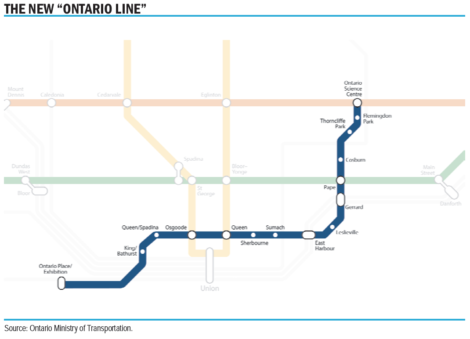One year after lambasting the last Liberal government for its zealous spending plans, Ontario Minister of Finance Victor Fedeli presented the Progressive Conservative (PC) party’s budget for the next year on April 11. While the budget revealed by former Premier Kathleen Wynne’s government in 2018 was characterized by heavy spending reflective of electoral pressures, the first budget of Premier Doug Ford’s term spends $4 billion more in the next year than the Liberals had projected for 2019–2020.
Big spending plans for the PCs centre on health care, with $17 billion in capital grants to hospitals over the next 10 years, $1.75 billion to long-term care solutions over five years, and $1.5 billion to emergency health services in the next year. A further $13 billion will be poured into capital grants in education over 10 years, with $1.4 billion for “school renewal” in the next year.
This budget also throws to popular policies in the PC party’s wheelhouse, such as creating tailgating permits for eligible sporting events, bringing the start time for alcohol service at licensed establishments up to 9:00 am, and creating a competitive market for online gambling.
As spending climbs higher, strategic cuts come with a budget that promises balance by 2023–2024: postsecondary education spending, for one, will decrease by one per cent per year until 2021–2022, from $12.1 billion to $11.7 billion. Spending on Children’s and Social Services will decrease by 2.1 per cent per year over the same period — a drop of $1 billion dollars.
While there is substantive spending in the health and education sectors, expenditures fall below this year’s projected 1.9 per cent inflation rate, with increases of 1.6 per cent and 1.2 per cent respectively. The Ministry of Indigenous Affairs will face cuts of $71.6 million — 51 per cent — in the next year.
The budget does not include many new substantive spending policies. Headline changes such as cutting compensation to Hydro One executives, capping the minimum wage at $14, and cutting postsecondary tuition by 10 per cent have been in the public eye for months.
Investments in mental health outlined in this budget represent the province matching federal contributions — pledging $1.9 billion over the next 10 years for mental health, addictions, and housing supports to a total of $3.8 billion in sector spending. This includes a $174 million investment in 2019–2020 for community mental health and addictions services, mental health and justice services, housing supports, and acute mental health inpatient beds.
The one page of the budget dedicated to spending on mental health and addictions is a stark departure from the six-page discrete section on the issue in the 2018 Liberal budget, which pledged $2.1 billion over four years in dedicated spending, including $11.7 million for mental health workers on postsecondary campuses. Details on mental health supports tailored to students and young people in this budget are scarce.
Uploading, expanding, and private partnerships: the transit plan
A notable part of this government’s spending plan is an ambitious investment in transit, with the province pledging $11.2 billion of the $28.5 billion required for the expansion and creation of four rapid transit lines in the GTA.
The budget clearly spells out the province’s commitment to looking to the private sector and public-private partnerships to revamp and expand mass transportation in Ontario.
GO Transit will be the first staging ground for a new, market-driven “Transit-Oriented Development Strategy” that replaces the Mimico GO station and creates a Woodbine GO station. This plan leverages third-party investment and government land by extending development opportunities atop and around transit stations if developers commit to building new transit infrastructure as well. All this with a view for the province to “unlock value from its assets, reduce the burden on taxpayers and promote residential development close to transit.”
The province also remains dedicated to overseeing a full upload of the TTC from the City of Toronto, planning to upload all subway extensions and planned new lines in the spring legislative session with existing networks to be uploaded in 2020. The fiscal logic behind uploading is that investing in transit projects without corresponding ownership doesn’t allow the province to amortize capital contributions and treat transit like other infrastructure projects.
Investment in Toronto transit expansion manifests in four distinct projects. The first is the Ontario Line, which builds on the city’s plans for a Downtown Relief Line by expanding it north and east from Pape Station to the Ontario Science Centre and southwest from Osgoode Station to a terminus at Ontario Place. Estimated costs for the project run at $10.9 billion, subject to market bids, with an estimated completion date “well in advance” of the 2029 goal from the city set for just the Relief Line South from Osgoode to Pape. Proposed cost-saving measures in the provincial plan include building a bridge over the Don River in place of a tunnel and using lighter and cheaper trains than currently used by the TTC.

A Yonge North Subway Expansion to Richmond Hill with an estimated cost of $5.6 billion is planned to follow the opening of the Ontario Line in 2029–2030. There are also plans to extend the Eglinton Crosstown Light Rail further into Etobicoke with an estimated cost of $4.7 billion to extend to Renforth Drive alone.
The province also reaffirmed commitments to a three-stop Scarborough Subway Expansion. The city’s estimates for a one-stop expansion are costed at $4 billion, and this budget projects that two additional stops could be added for $1.5 billion more. $1 billion in funding is expected from the city, $660 million from the federal government, and $2 billion from the province. The federal and provincial governments are expected to commit an equal share to the remaining incremental costs.
Indications from the city are that both the Relief Line South and Scarborough Subway Expansion could cost significantly more than anticipated, and the province is calling on the city to confirm revised estimates.


